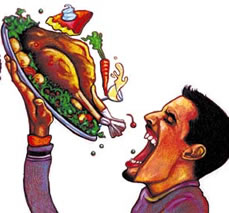TILL DEATH DO US PART
July 19, 2013
Nearly Two million divorces will probably be granted this year in the United States. This is three times the number recorded just twenty years ago. The 21st century has witnessed a striking increase in the Divorce rate. Most nations of the world seem to be following a similar trend.
Today, more than one out of every three marriages ends in divorce; unfortunately, families within the church are following this world pattern to an alarming rate. More and more spouses choose divorce as a way to escape from Obstacles in their family life, instead of facing the problem, while allowing God to be the center of their marriage. Usually the reasons for this rising divorce rate, falls into three main categories:
1. Changes in the women’s roles in the home.
2. Adultery in the marriage.
3. financial instability.
As we leap into the 21st century, we face a whole new world of marital problems, especially as we focus on the breakdown of the modern day marriage and family, and the epidemic statistics as such, in our society as a whole. While there is hardly a Christian family that, directly or indirectly, does not know the pain of divorce.
An important factor that contributes to this alarming escalation of divorce among Christians is the growing acceptance of the societal view or compromise of the standard of marriage as a social contract, governed by civil laws, rather than as a sacred covenant, witnessed and guaranteed by God Himself.
 Instead of promising each other faithfulness “till death do us part,” many couples are adopting the modern day version of the marriage vow, by pledging to remain together “as long as we both shall love. The recent, no fault divorce law, makes the dissolution of marriage so easy that some lawyers advertise divorce services for less than $100.00. All legal fees and services are included in one low price. What a sad commentary on the cheapness of marriage today.
Instead of promising each other faithfulness “till death do us part,” many couples are adopting the modern day version of the marriage vow, by pledging to remain together “as long as we both shall love. The recent, no fault divorce law, makes the dissolution of marriage so easy that some lawyers advertise divorce services for less than $100.00. All legal fees and services are included in one low price. What a sad commentary on the cheapness of marriage today.
What God has united, many will put asunder for less than what Judas sold our Lord and Savior for, a measly thirty pieces of silver. Satan therefore is gaining much more success as he plants his banner in the marriage institution that same institution God implemented and blessed at creation, between man and woman, in the Garden of Eden. But it has always been Satan’s plan to debase, demoralize, and pervert the marriage institution while weakening its sacredness, and commitment to the words that couples should make in the presence of God which states.
To be true to each other in good and bad times, to love and honor each other all the days of your lives, committing to have and to hold for better or worse for richer or poorer in sickness and health, to love and to cherish, from this day forward until death do us part.
 And once repeated before God these vows should be with God’s grace, who is and should always be the foundation of the marriage and home. On this happy occasion Satan observes carefully each day, as he studies one’s heart, and mind, as he has with fiendish intensity for six thousand years, while pointing out most easily one’s character flaws that would cause each and everyone who takes their marriage vows to lose sight of Christ, while never willing to yield or compromise with one another thus bringing on unhappiness and most cases divorce.
And once repeated before God these vows should be with God’s grace, who is and should always be the foundation of the marriage and home. On this happy occasion Satan observes carefully each day, as he studies one’s heart, and mind, as he has with fiendish intensity for six thousand years, while pointing out most easily one’s character flaws that would cause each and everyone who takes their marriage vows to lose sight of Christ, while never willing to yield or compromise with one another thus bringing on unhappiness and most cases divorce.
But each, man and woman must have the Spirit of God and if the Spirit of God dwells in one’s heart there will be a type of heaven on earth in the home, and by God’s grace each will succeed in making the other happy till death do you part. So as your marriage vows unites you as one, the wife is to respect her husband, the husband is to love and cherish his wife so their belief in Christ should make them as one in Him, while they seek to become more and more imbued with the Spirit of Christ.
Thus, allowing for a perfect harmony between the husband and wife who enter into a covenant with God. So today, let man and woman in the presence of God pledge themselves to love each other as God has ordained they should, and in your life together your affections are to complement each other’s happiness and individuality in other words, God should always be the focus of your individuality.
Of Him you are to ask: What is right? What is wrong? How may I best fulfill your purpose in our union together? For if we don’t place God at the center, Satan will be ever ready to take advantage when any matter of variance arises. Because it is at that point he moves upon the objectionable and different traits of character in husband or wife, while causing alienation between both parties who have united a solemn convenient before God.
So always remember, in your marriage if the law of God is obeyed, and cherished, Satan will be kept out of the home and family, and compromise of interest for one another, will always take place, and no alienation of affection will be permitted.
And as we move closer to Christ soon coming, Satan will work with all the powers he tempted ancient Israel, just before they entered the PromiseLand. He will lay snares for those who claim to keep Gods commandments and as we are right at the heavenly borders he will use all powers, to destroy God’s children at their weakest point in their marriage.
But if you will stay focused on Christ abiding love, and endure through His word and Spirit while upholding those vows sacred you both made in His presence. what grace has begun, the glory of God will present with A victory crown one day, very soon, in His pure and holy kingdom.
So my friends today. Stay focused, remain faithful, love one another and endure till the end and never forget to STUDY&PRAY

























